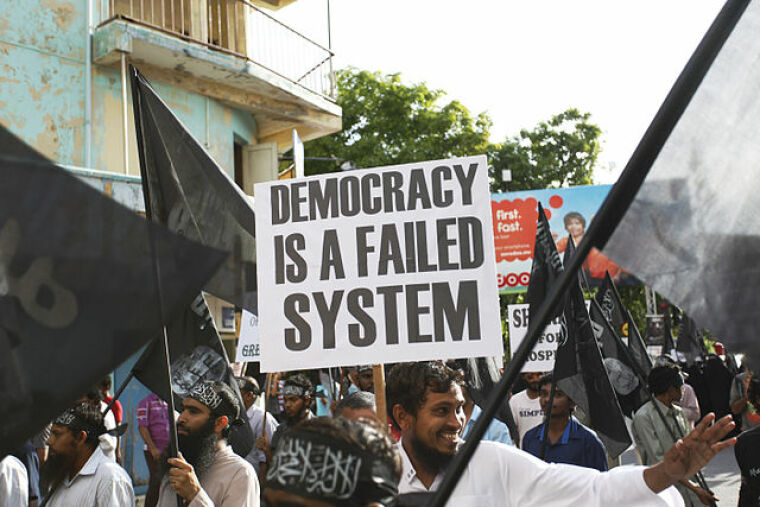Montana House advances bill to prohibit courts from applying Sharia law

The Montana House of Representatives has advanced a legislation that would prohibit courts from applying Sharia law or other foreign laws in the state.
Senate Bill 97, introduced by Keith Regier (R-Kalispell), was passed by the House last week largely along party lines by a vote of 56–44, Daily Inter Lake reported.
The bill does not specifically mention Sharia, but it was often the focus of discussion during the debate. Democrats argued that the measure is motivated by fear and that it targets a specific religion.
"If you go back and listen to the testimony of the proponents of this bill in both the House and Senate, the legislative intent is crystal clear that it targets one religion," said Rep. Ellie Hill Smith (D-Missoula). "That this was a Shariah law bill. It's what every proponent had talked about," she added.
Rep. Shane Morigeau (D-Missoula) expressed his concern that the legislation would send a dangerous message to minority groups who are living in Montana as well as those who come to visit the state.
He also expressed concern that the measure could create problems for tribal governments in the state that have international agreements with tribal nations in Canada, including the Kootenai and Blackfeet tribes.
Proponents of the bill said that it was intended to protect the freedom of religion and that it simply reinforces the Montana and U.S. constitutions.
"As far as being determined xenophobic, that's an insult. I'm not intolerant. This is not anti-Muslim." said Rep. Brad Tschida (R-Missoula).
Smith, who said that testimony on the bill was "peppered with anti-Muslim bigotry," proposed an amendment that would ban both Sharia and the Law of Moses, but it was rejected by a vote of 82–18.
Theresa Manzella (R-Hamilton) maintained that the measure was not intended to be a religious law.
"We are born with rights and government exists to protect those rights. We're given those rights as individuals and that's what makes us better than other countries that are based on collective rights," she said.
Sharia, which utilizes religious texts to determine the divine will, is applied differently across the world. Saudi Arabia implements strict punishments such as stoning, while other countries use it in personal law such as marriage and divorce.
 Christians don't have to affirm transgenderism, but they can’t express that view at work: tribunal
Christians don't have to affirm transgenderism, but they can’t express that view at work: tribunal Archaeology discovery: Medieval Christian prayer beads found on Holy Island
Archaeology discovery: Medieval Christian prayer beads found on Holy Island Presbyterian Church in America votes to leave National Association of Evangelicals
Presbyterian Church in America votes to leave National Association of Evangelicals Over 50 killed in 'vile and satanic' attack at Nigerian church on Pentecost Sunday
Over 50 killed in 'vile and satanic' attack at Nigerian church on Pentecost Sunday Ukrainian Orthodox Church severs ties with Moscow over Patriarch Kirill's support for Putin's war
Ukrainian Orthodox Church severs ties with Moscow over Patriarch Kirill's support for Putin's war Islamic State kills 20 Nigerian Christians as revenge for US airstrike
Islamic State kills 20 Nigerian Christians as revenge for US airstrike Man who served 33 years in prison for murder leads inmates to Christ
Man who served 33 years in prison for murder leads inmates to Christ


 Nigerian student beaten to death, body burned over ‘blasphemous’ WhatsApp message
Nigerian student beaten to death, body burned over ‘blasphemous’ WhatsApp message 'A new low': World reacts after Hong Kong arrests 90-year-old Cardinal Joseph Zen
'A new low': World reacts after Hong Kong arrests 90-year-old Cardinal Joseph Zen Iran sentences Christian man to 10 years in prison for hosting house church worship gathering
Iran sentences Christian man to 10 years in prison for hosting house church worship gathering French Guyana: Pastor shot dead, church set on fire after meeting delegation of Evangelicals
French Guyana: Pastor shot dead, church set on fire after meeting delegation of Evangelicals ‘Talking Jesus’ report finds only 6% of UK adults identify as practicing Christians
‘Talking Jesus’ report finds only 6% of UK adults identify as practicing Christians Mission Eurasia ministry center blown up in Ukraine, hundreds of Bibles destroyed: 'God will provide'
Mission Eurasia ministry center blown up in Ukraine, hundreds of Bibles destroyed: 'God will provide' Church holds service for first time after ISIS desecrated it 8 years ago
Church holds service for first time after ISIS desecrated it 8 years ago Burger King apologizes for 'offensive campaign' using Jesus' words at the Last Supper
Burger King apologizes for 'offensive campaign' using Jesus' words at the Last Supper Uganda: Muslims abduct teacher, burn him inside mosque for praying in Christ’s name
Uganda: Muslims abduct teacher, burn him inside mosque for praying in Christ’s name